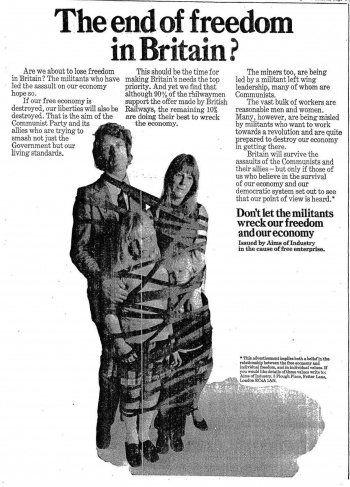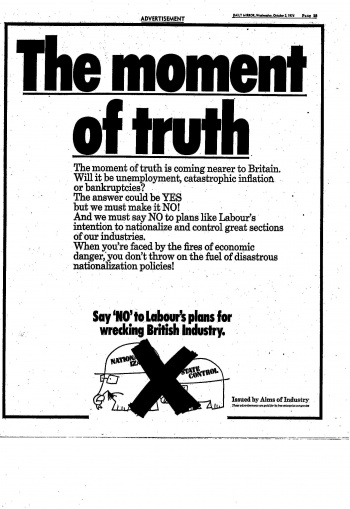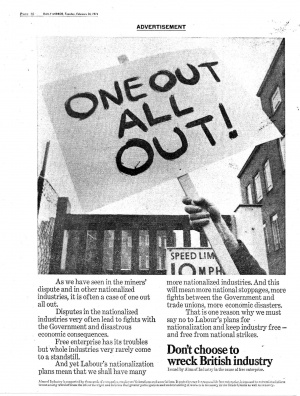Difference between revisions of "Aims of Industry"
| Line 13: | Line 13: | ||
* To oppose, and wherever possible reduce, unnecessary government intervention by state ownership, control or excessive bureaucracy.<ref>Hubert Starley ''40 Years Fighting for Free Enterprise: A Personal History of Aims of Industry'', Aims of Industry.</ref> | * To oppose, and wherever possible reduce, unnecessary government intervention by state ownership, control or excessive bureaucracy.<ref>Hubert Starley ''40 Years Fighting for Free Enterprise: A Personal History of Aims of Industry'', Aims of Industry.</ref> | ||
| − | [[File:The Moment of Truth.jpg|thumb|right| | + | [[File:The Moment of Truth.jpg|thumb|right|350px|'The moment of truth', press advert from [[Aims of Industry]] in The [[Daily Mirror]], 2 October 1974; p. 25.]] |
| − | + | [[File:One out All Out.jpg|thumb|right|300px|'One out, All out!', press advert from [[Aims of Industry]] in ''[[The Daily Mirror]]'', 26 February 1974; p. 22.]] | |
In its early years Aims was at the forefront of corporate campaigning against democratic decision making in Britain. When the Conservative Party split over Europe in the 1980s and 90s, some of Aims key leaders took the 'Eurosceptic' side, rendering them marginal in transnational business circles - so much so that the 'pro-european' lobby group [[Britain in Europe]] backed by Transnational business carried a profile of them: | In its early years Aims was at the forefront of corporate campaigning against democratic decision making in Britain. When the Conservative Party split over Europe in the 1980s and 90s, some of Aims key leaders took the 'Eurosceptic' side, rendering them marginal in transnational business circles - so much so that the 'pro-european' lobby group [[Britain in Europe]] backed by Transnational business carried a profile of them: | ||
| Line 36: | Line 36: | ||
===Tate not state=== | ===Tate not state=== | ||
| − | [[Image:tate.jpeg| | + | [[Image:tate.jpeg|left|thumb|100px|Tate not State the successful campaign run by Aims of Industry to prevent the nationalisation of the sugar industry on behalf of Tate and Lyle]] |
:History’s most famous sugar lump was ‘Mr Cube’, an animated cartoon character born in July 1949 in a climate of grey austerity, rationing and contentious nationalisation proposals. Mr Cube became sugar’s brand image, the company logo of Tate & Lyle and a symbol of political embarrassment and electoral setback for the Labour government in the February 1950 General Election. | :History’s most famous sugar lump was ‘Mr Cube’, an animated cartoon character born in July 1949 in a climate of grey austerity, rationing and contentious nationalisation proposals. Mr Cube became sugar’s brand image, the company logo of Tate & Lyle and a symbol of political embarrassment and electoral setback for the Labour government in the February 1950 General Election. | ||
Revision as of 17:18, 9 December 2010
Aims of Industry was founded in 1942 as an independent free enterprise corporate lobby group by business leaders in industry. It came into existence to combat nationalisation of key British industries such as sugar, iron and steel. It campaigned against the creation of the National Health Service in 1945. It was known as Aims for Freedom and Enterprise from 1975-78 and Aims from 1978-80.

Although not directly involved in party politics, Aims of Industry is closely linked to the Conservative Party and the Freedom Association.
It makes an annual "National Free Enterprise Award", recipients of which have included F.A. Hayek, Margaret Thatcher and John Blundell.
Contents
Aims' Objectives
According to the history of Aims published by the organisation in 1982 their objectives were:
- To defend free enterprise and freedom
- To create a public belief in free enterprise so that the government can take the right decisions and companies can achieve their objectives.
- To oppose, and wherever possible reduce, unnecessary government intervention by state ownership, control or excessive bureaucracy.[1]


In its early years Aims was at the forefront of corporate campaigning against democratic decision making in Britain. When the Conservative Party split over Europe in the 1980s and 90s, some of Aims key leaders took the 'Eurosceptic' side, rendering them marginal in transnational business circles - so much so that the 'pro-european' lobby group Britain in Europe backed by Transnational business carried a profile of them:
- In March 1998 Aims of Industry launched a Campaign against the European Single Currency. Two Council members of Aims of Industry, Sir Nigel Mobbs and Jamie Borwick (Sponsor/Patron, Bruges Group, since 1989) were National Council members of Business for Sterling.[1]
Personnel
- Lord Michael Forsyth of Drumlean, president (former Conservative Secretary of State for Scotland, 1995-97)
- Sir Nigel Mobbs, Chairman
- Mike Fisher, Trustee
- Bertie Bridges Webb Director from 1957-1970
- John Lyle Chairman in 1982, fo the Surgar corporation Tate and Lyle
Its former Director and Consultant was Michael Ivens (Joint Founder and Vice-President, Freedom Association, 1975-2001).
Aims of Industry claims 800 members, with six full-time members of staff.[2]
Funding
Past funders are thought to have included Balfour Beatty [3] and Slough Estates [4]. British American Tobacco supported Aims from 1949 until 1991 [5], [6].
Campaigns
Tate not state
- History’s most famous sugar lump was ‘Mr Cube’, an animated cartoon character born in July 1949 in a climate of grey austerity, rationing and contentious nationalisation proposals. Mr Cube became sugar’s brand image, the company logo of Tate & Lyle and a symbol of political embarrassment and electoral setback for the Labour government in the February 1950 General Election.
- Peter Runge, the company’s campaign strategist, has recalled how ‘we were strongly advised to have a cartoon character who, if he caught the public’s imagination, could say the most outrageous things and get away with it, and who could act as a buffer between the public and Tate & Lyle’. Brandishing his sword of free enterprise and protected by his T&L shield, Mr Cube would ‘say sensible, cogent or outrageous things’ with appropriate grimaces and gesticulations, allowing Tates to ‘concentrate on attacking the Socialist policy in a somewhat more dignified manner’. [7]
Aims of Industry publications
1940s-1950s
- Lord Perry, Industry in Reconstruction, Aims of Industry, 1943.
- Sir Roland Evans Industry: The Key to National Security Aims of Industry, March 1944.
1960s-1970s
- Aims of Industry 30 years of Aims of Industry London: Aims of Industry 1972. ISBN: 090003565X
- Aims of Industry, Organised Political Pressure on Companies Anti-Anti-Report (Counter counter information services), 1973
- Alan Walters Money and Inflation Aims of Industry, undated, but around 1974.
1980s
- Michael Forsyth MP Barriers to Privatisation, Aims of Industry, 1984.
- Hubert Starley 40 Years Fighting for Free Enterprise: A Personal History of Aims of Industry, Aims of Industry.
Related
- Economic League
- Scottish Free Enterprise Award Award given by Aims
Resources
- Labour Research Department Who is Behind Them?, May 1953.
- Sugar Slogans Time, Aug. 29, 1949
Other Publications
- Dead Ducks and Lame Ducks - Must the Public Always Pay, Aims of Industry (January 1972)
- Organisation and Financing of the French Communist Party, Aims of Industry (January 1974)
- Shipbuilding, Ship Repairing & Marine Engineering:Suppliers' Attitudes to Nationalization: Suppliers' Attitudes to Nationalization , Aims of Industry (January 1974)
- Halfway to 1984 - 1979, Aims of Industry (January 1974)
- Industry and Political Contributions , Aims of Industry (January 1969)
- The Industries That Labour Wants to Nationalize:Ship Building: Ship Repairing & Marine Engineering, Aims of Industry (January 1974)
- The Industries That Labour Wants to Nationalize:Insurance: Insurance, Aims of Industry (January 1974)
- The Winter of Our Discontents, Aims of Industry (January 1970)
- Edition Programme, Aims of Industry (January 1973)
- Industrial Concentration and Public Policy, Aims of Industry (January 1973)
- Socialists on the Board: The Case against the National Enterprise Board, Aims of Industry (January 1974)
- The Trade Union and Labour Relations (Amendment) Bill: The Right to Work-the Right to Write, Aims of Industry (January 1975)
- Mass Unemployment, Can It Be Halted, Aims of Industry (January 1974)
- Trouble at Britain's Docks, Aims of Industry (January 1975)
- Guide to Industrial Participation: Essential Steps, Essential Research, Aims of Industry (January 1974)
- To Fight Together or Hang Separately against the Most Corporatist Document, Aims of Industry (January 1973)
- Let's Back the Workers on Nationalization, and the Labour Voter, Too, Aims for Freedom and Enterprise (January 1975)
- Evidence to the Committee on Aid to Political Parties, Aims for Freedom and Enterprise (January 1975)
- Electors' Opinions on the Communist Danger to Britain and British Industry: A Survey Carried Out for Aims of Industry by NOP Market Research, Aims of Industry (January 1975)
- A Case for a Tax Refund to Industry, Aims of Industry (January 1968)
- Import Deposits: A Survey of Effects on Industry and Business, Aims of Industry (January 1969)
- Posts and Telephones: a Survey of Users' Reports on Service, Aims of Industry (January 1970)
- 30 Years of Aims of Industry, Aims of Industry (January 1972)
- Organised Political Pressures on Companies: An Anti-Anti-Report (Counter Counter Information Services), Aims of Industry (January 1973)
- Local Government Corruption: Cancer and Cure, Aims of Industry (January 1973) *Evidence for the Royal Commission on the Press, Aims of Industry (January 1974)
- Always to Be Shielded: Must We Move towards Unionocracy, Aims of Industry (January 1974)
- The Industry Act: Should Industry Help the Executioner, Aims of Industry (January 1974)
- The Industries That Labour Wants to Nationalize: the 100 Top Companies, Aims of Industry (January 1974)
- Mr. Shelepin Smiles: Radical Revolutionary Transformations and the Tactics of Confrontation, Aims of Industry (January 1974)
- Progress Report from KGB Station Chief, London, England to Comrade Yuri Andropov, KGB Supreme Chief, Moscow, Date, Eve of 25th Communist Party Congress, 1976 (Special Report as Requested), Aims for Freedom and Enterprise (January 1976)
- Attitudes of Students to Politics, Economics and Society: Survey, Aims for Freedom and Enterprise (January 1976)
- The Industries That Labour Wants to Nationalize:Construction, Aims of Industry (January 1974)
- The Industries That Labour Wants to Nationalize: Pharmaceuticals, Aims of Industry (January 1974)
- The Industries That Labour Wants to Nationalize: Land, Aims of Industry (January 1974)
- Reds under the Bed, Aims of Industry (January 1974)
- The Image of Britain Abroad: An Investigation of Attitudes by Foreign Correspondents to British Industry, Aims for Freedom and Enterprise (January 1975)
- Trade Union Political Funds , Michael William Ivens Aims for Freedom and Enterprise (January 1978)
- International Papers on the Revival of Freedom & Enterprise by Michael William Ivens, Aims for Freedom and Enterprise (January 1978)
References
- ↑ Hubert Starley 40 Years Fighting for Free Enterprise: A Personal History of Aims of Industry, Aims of Industry.
- ^ Aims of Industry profile, Britain in Europe website, accessed January 2004. No longer online, but available via the Internet Archive
- Balfour Beatty profile, Corporate Watch, Winter 1996
- Tories' business backers: are they ethical?, Friends of the Earth press release, 4 June 2001
- Chris Marsden, "British mercenaries planned assassination of Kurdish leader Abdullah Ocalan", Sunday Times, 24 August 1999.
- Obituary: 'Michael Ivens: Champion of the libertarian right and business freedom', Roger Cowe, Wednesday November 21, 2001 The Guardian [8]
- ^ Ron Noon, 'Goodbye Mr Cube', History Today, October 2001 | Volume: 51 Issue: 10 | Page 40 - 22
